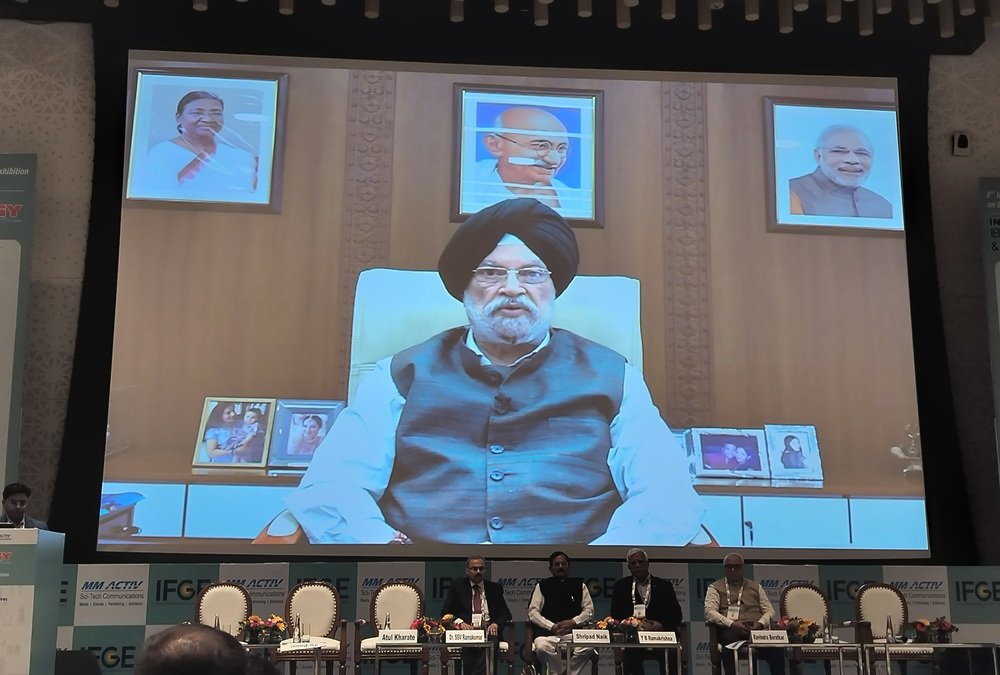Monday, 23 February 2026

Underscoring the extensive progress made in the bioenergy sector, Hardeep Singh Puri, Minister for Petroleum and Natural Gas, asserted that to keep India’s bioenergy ecosystem globally competitive, industries must focus on innovation, public-private partnership and a farmer-centric approach on the second day of the India Bioenergy & Tech Expo, an International Exhibition and Conference on Bioenergy and Technologies, at Yashobhoomi (New Delhi) in a video message. He also acknowledged the significance of the platform in facilitating discussions and knowledge sharing on bioenergy.
Hardeep Puri, said, “The industry must continue on the path of innovation, private-public partnerships and farmer-centric policies to ensure that India’s bioenergy ecosystem remains globally competitive. Let us move forward towards a greener and energy-secure future.”
He further reaffirmed the Government of India’s commitment to building a robust and sustainable bioenergy sector that is not only an economic pillar but also a guiding force in the country’s renewable energy landscape.
India aims for 500 gigawatts of non-fossil fuel capacity by 2030. 251.5 gigawatts of non-fossil fuel capacity have been installed as of September 2025. Over 113 compressed biogas plants are commissioned, with 78 more under construction. Ethanol blending has increased from 1.5 per cent in 2014 to 20 per cent today. A bamboo-based biorefinery in Assam is producing ethanol and value-added products, he added.
Gracing the event, Shripad Naik, Minister of State for New and Renewable Energy said, “Bioenergy technologies must become more efficient, scalable and affordable. (Advancement in) R&D, public-private partnerships, skilling and international collaboration are essential to overcome (bioenergy technologies related) challenges.”
He further called on all stakeholders to work in tandem to scale the bioenergy sector. India has made significant progress in renewable energy, with bioenergy playing a crucial role.
He urged that stakeholders, policymakers, industries, entrepreneurs, finances, innovators, and researchers to work together to scale up driven technologies. Strengthen R&D and innovation of biomass conversion technologies. Support farmers and rural entrepreneurs with fair prices and transparent biomass supply chains. Build capacity and train skilled workers to run bioenergy systems sustainably and increase investments from the private sector to continue biomass resources and usages.
India’s installed power capacity is 50 per cent from non-surgent sources, placing it among the top four renewable energy markets globally. Over 500 new biogas and biomass projects have been commissioned since 2022, and 35,000 small biogas plants installed in the last three years. India generates over 228 million tons of agriculture residues and 62 million tons of municipal solid waste annually, with potential for 42 GW electricity or 60,000 tons/day of CBG, he added.
Dr SSV Ramkumar, Chairperson, IFGE: Sustainable Aviation Fuel Forum (SAFF), EVP/CTO Greenko/ AM Green emphasised, “Second-generation ethanol should be recognised under the ITMOS mechanism, so that more Indian entrepreneurs would be emboldened to produce low-carbon-intensity ethanol.”
Dr Ramkumar highlighted India’s success in bioenergy, particularly bioethanol, and advocates for second-generation ethanol.
India saved 1.4 lakh crores in foreign exchange and transferred 1.2 lakh crores to farmers through bioethanol blending. Second-generation ethanol significantly reduces carbon footprint compared to first-generation and fossil fuels. Asia’s first second-generation ethanol plant (rice straw to ethanol) was commissioned in 2020. A joint venture company successfully commissioned a second-generation bioethanol refinery converting bamboo to ethanol. The Ministry of Commerce permitted the export of second-generation ethanol. Second-generation ethanol is a key ingredient for sustainable aviation fluids, he added.
Ravindra Boratkar, Founder Member, IFGE & Managing Director MM Activ Sci-Tech Communications, said, “India needs to follow in the footsteps of Brazil with respect to biofuels. We look forward to greater interaction between stakeholders and more discussion tomorrow on this.”
Sanjay Ganjoo, Director General, Indian Federation of Green Energy, said, “Discussion and collaboration are key to accelerating widespread bioenergy adoption in India. This event serves as a platform for greater discussion on the crucial topic.”
Day 2 of the second edition of the event also featured sessions on biomass, green hydrogen, feedstock supply chains and storage, evolving opportunities in CCUS, and more.
The three-day event is currently underway, with more than 170 senior government officials, policymakers, experts, industry leaders, research scholars, and other dignitaries participating. In addition, over 100 companies are showcasing their technologies, products, and services.
Uttar Pradesh, one of the leading states in bioenergy, is participating as the Partner State. The event is supported by the Ministries of MNRE, Power, MoRTH, DST, and MSME. Leading industry associations, including ISMA, NFCSF, IBA, GEMA, and WBA, are also supporting the event.